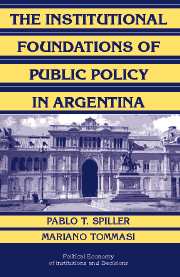Book contents
- Frontmatter
- Contents
- Acknowledgments
- Introduction
- I An Intertemporal Approach to Policy Making
- II The Workings of Political Institutions, Policy Making, and Policies in Argentina
- 3 Congress, Political Careers, and the Provincial Connection
- 4 Federalism, Argentine Style
- 5 The Supreme Court
- 6 The Bureaucracy
- 7 The Nature of Public Policies in Argentina
- Concluding Remarks
- References
- Index
- POLITICAL ECONOMY OF INSTITUTIONS AND DECISIONS
3 - Congress, Political Careers, and the Provincial Connection
Published online by Cambridge University Press: 17 March 2011
- Frontmatter
- Contents
- Acknowledgments
- Introduction
- I An Intertemporal Approach to Policy Making
- II The Workings of Political Institutions, Policy Making, and Policies in Argentina
- 3 Congress, Political Careers, and the Provincial Connection
- 4 Federalism, Argentine Style
- 5 The Supreme Court
- 6 The Bureaucracy
- 7 The Nature of Public Policies in Argentina
- Concluding Remarks
- References
- Index
- POLITICAL ECONOMY OF INSTITUTIONS AND DECISIONS
Summary
Legislatures are critical institutions in the effective functioning of a democratic system and in the policy-making process. In terms of the framework developed in Part I, Congress is the most natural arena for the institutionalized political exchanges necessary to sustain effective public policies. The ability of the congressional arena to play such a role varies substantially from country to country. At the more proactive and constructive end of the spectrum, the U.S. Congress is able to develop its own legislative proposals and has an active role in directing the policy agenda as well as in overseeing policy implementation. Congress itself is institutionalized in a manner that facilitates intertemporal exchanges and that leads to the accumulation of policy capabilities (Weingast and Marshall 1988; Krehbiel 1991). This, in turn, is associated with legislators having the right human capital characteristics to make them productive in those roles (Diermeier, Keane, and Merlo 2005).
The extensive literature on the U.S. Congress provides a detailed and relatively comprehensive understanding of this institution and a set of widely accepted truisms. Members of the U.S. Congress serve long terms in office. They specialize in the topics of committees on which they serve. They play an active role in the policy-making process. As an institution, the U.S. Congress engages in considerable oversight of the public bureaucracy, and it is at the center of policy making.
- Type
- Chapter
- Information
- The Institutional Foundations of Public Policy in ArgentinaA Transactions Cost Approach, pp. 53 - 88Publisher: Cambridge University PressPrint publication year: 2007
- 3
- Cited by



